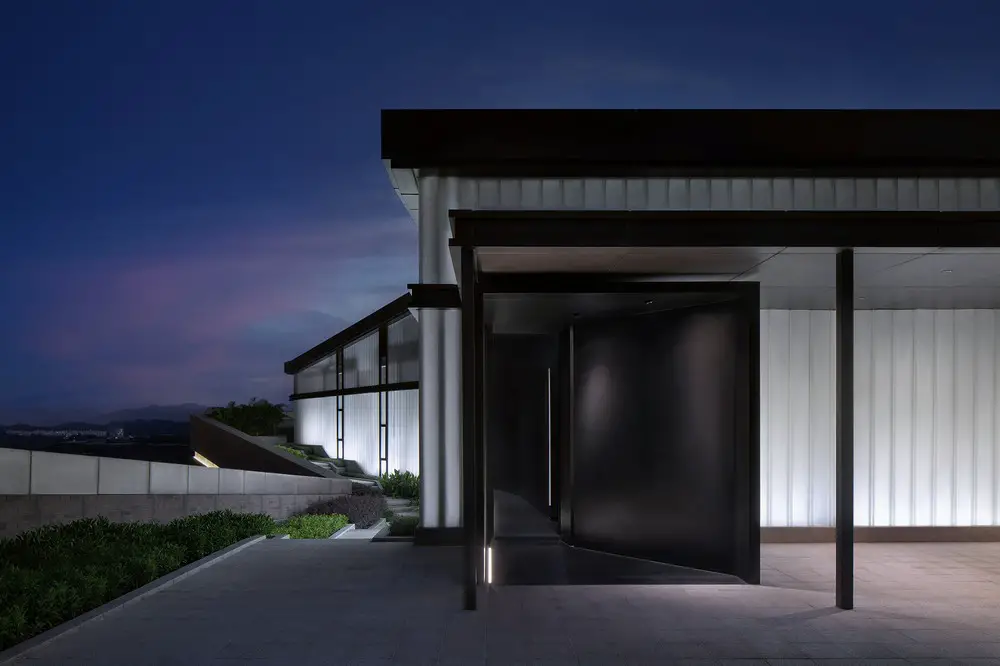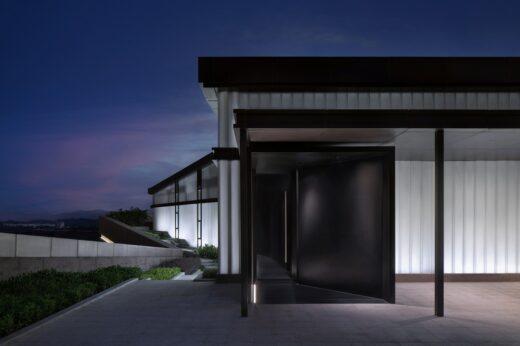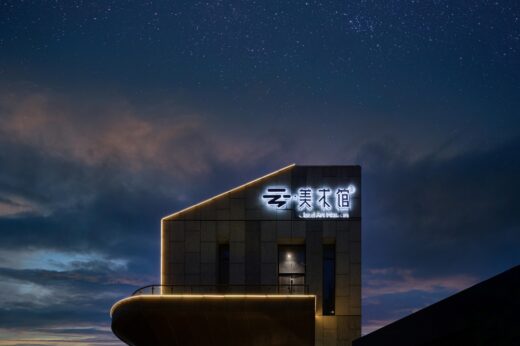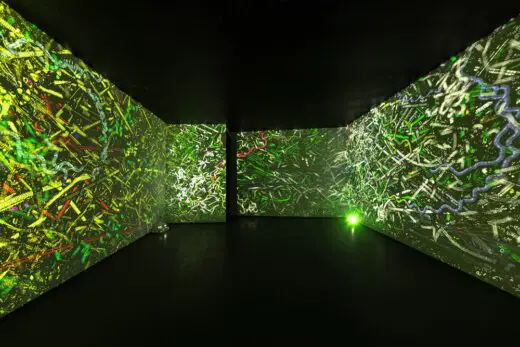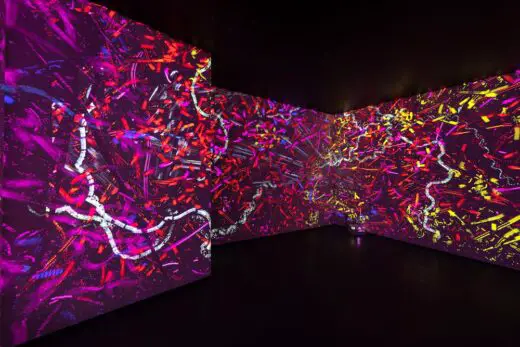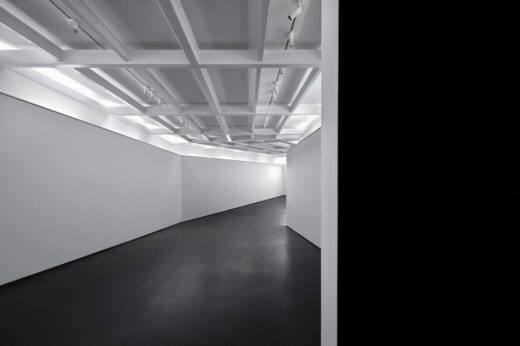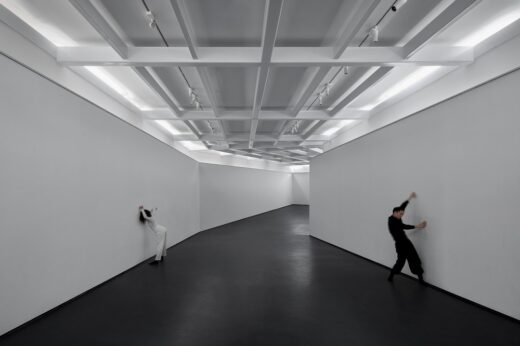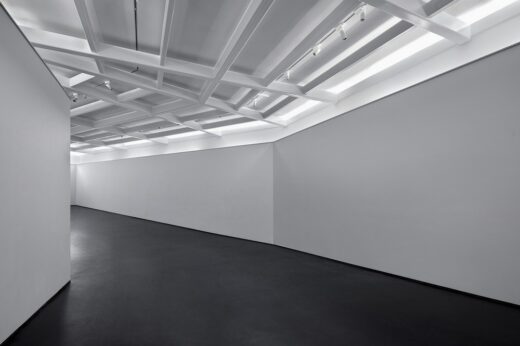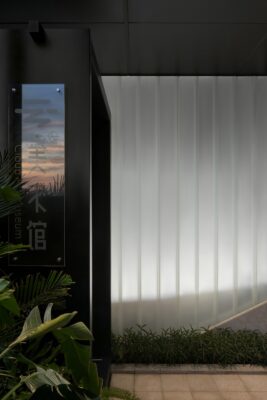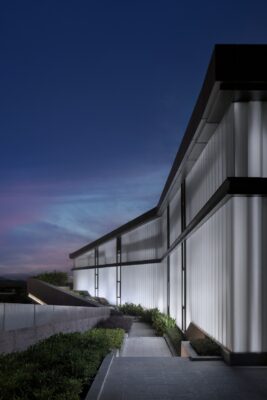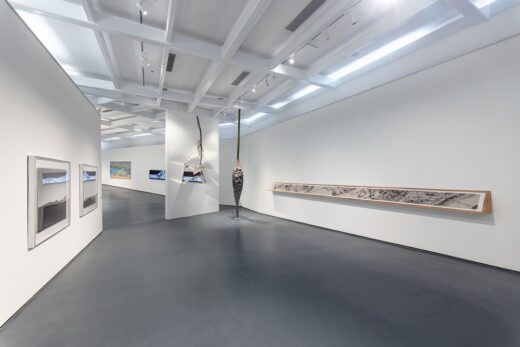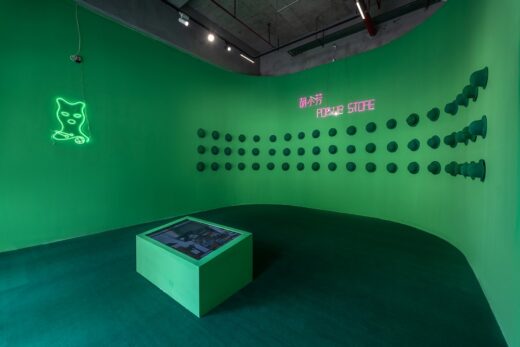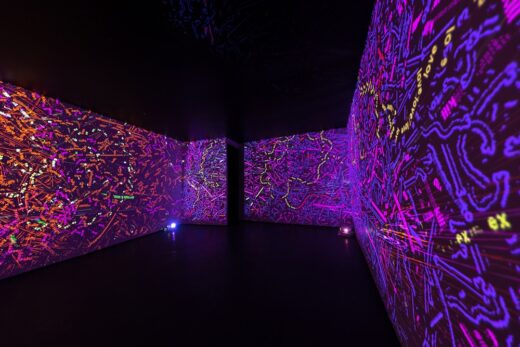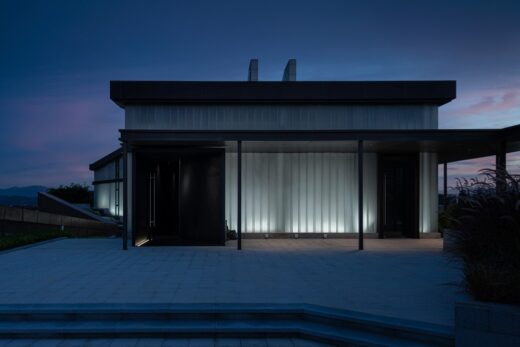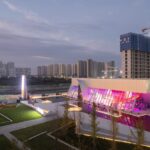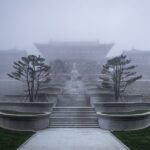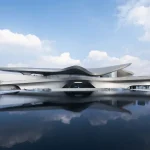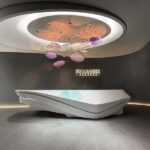Cloud Art Museum, Shenzhen Exhibition Space, Chinese Interior Architecture, China, Photos
Cloud Art Museum in Shenzhen
19 May 2022
Interior: HLD Art & Design
Location: Shenzhen, China
Photos: Sean, Mao Yanjun, Xie Yujie
Cloud Art Museum, China
“Art Spirit Church of a Community”
Injecting art spirit into community culture, community-based art museums will bring a new lifestyle.
Cloud Art Museum is situated within a residential community at the junction between Huizhou and Shenzhen. HLD Art & Design fully integrates the architectural space with art, starting a spiritual revolution of art and community lifestyle.
Art museum as the spiritual church of community
With rapid urbanization and the development of technology and art, material life has been enriched and lifestyle keeps evolving. Many property developers start to slow down the pace and shift the focus to community operation. The project is sited in Beyond The Valley, which is a comprehensive community located at the junction area between Shenzhen and Huizhou and enjoying beautiful natural landscapes.
Rongjiang Industrial Group, the developer and operator of Beyond The Valley, adopted “art intervention” approaches to endow the residential community with a new soul. By breaking through the shackles of physical architectural space and building innovative spiritual spaces, it aims to turn the residential community into a spiritual home.
Birth of Cloud Art Museum
Cloud Art Museum, which carries community culture as well as art spirit, becomes a new artistic and cultural spiritual venue in Beyond The Valley community, and revolutionizes the lifestyle of people living here.
“Art spirit church” of the community
“Cloud Art Museum links with residents in the community through artworks. It’s not only a space for interaction between people and people, artworks and visitors, but also a channel for the community to connect with the outside. It brings warmth to the community, and expands the residents’ spiritual world through artworks.” Shen Shaomin, the art consultant of the project, explained.
For the design team, the major challenges were to reconstruct the existing physical space, to fuse the space and art spirit, and to let it resonate with community life.
Art museum turned into a series of art installations
“White Cane Safety Day” is a verse that Shen Shaomin wrote for blind people several years ago. Braille characters of this poem are transformed into decorations and details in the circular art gallery, which play a quite constructive role in promoting the community’s welfare and shaping its culture. In this way, the spatial design well conveys the community’s values.
HLD Art & Design applied curatorial thinking to the art of space, which breaks the conventional cognition about space. The spatial transformation and digital interactive technology bring technology, community, people and nature closer. Based on the concept of “community’s co-created art museum”, the design team worked with artists to incorporate creative design languages into the existing irregular space.
“In light of the irregular structure and limited scale of the art museum, and in order to enrich its display functions, we created a 1-meter-wide circular art gallery on the edge, which helped to double the exhibition route. The art gallery also functions as a black tunnel leading to the white hall, providing visitors with a fantastic experience seeking light”, renowned artist Shen Shaomin added.
“Mr. Shen took advantage of the interior surfaces to create public art, turning daylighting openings into a Braille verse. Due to the limited scale of the art museum, we decided to create an art gallery loop to increase the area for displaying artworks, after several rounds of discussions. It produces a cramped yet unique spatial experience for visitors whist also breaking with design limitations of the conventional white-box space,” founder of HLD Art & Design Zhou He said.
The limited spatial scale caused difficulties in the organization of circulation routes. The double-slope floor and glass architectural components also posed a great challenge to the project.
As approaching these problems, the design team communicated with art consultant Shen Shaomin and decided to adapt to the site’ conditions to turn the slope into a highlight of the space. The existing sloped floor was retained, allowing visitors’ experience to vary with the height difference while appreciating artworks. The unique visual experience and sloped floor establish an interaction between visitors and the space. On the other hand, the design team made full use of the glass facade components to bring in daylight, to guide the sight line and create a distinctive visual space.
The narrow, long and dark art gallery space creates a tranquil environment, where artworks showcased in the linear space guide the circulation route while expressing emotions.
The spatial design of Cloud Art Museum follows curatorial thinking, and subtly integrates the distinctive architectural environment with the emotional and inclusive art atmosphere. The undulating floor offers visitors distinct physical and spiritual experiences. With the spatial design languages combined, the project creates an “improvisational” art space filled with an unexpected philosophical vibe.
Art spirit integrated into the whole process from planning and interior design to operation
While conceiving the physical space, HLD Art & Design provides a variety of possibilities for the future operation of the community-based art museum, including curation, art creation, and public education of art. Acting as an exhibition coordinator, HLD Art & Design have assisted Cloud Art Museum in organizing a multitude of exhibitions and workshops, to create the paradigm for the future operation of art museum.
Zhou He, founder of HLD Art & Design says: “We took into consideration the museum’s operation in spatial design. A community art museum is socially significant, somewhat like a spiritual fortress. Art provides a spiritual get-together among artists, designers, anthropologists, scientists and residents in the community. The exhibitions and public education activities enable the meaningful transmission and communication of public artworks.”
“The art museum not only satisfies local residents’ demand for a physical art space, but also will evoke their sense of pride and belonging at spiritual level. It enables children in the community to grow up surrounded by art and beauty, and will plant the seeds of aesthetics in their hearts. The significance of this community art museum will be testified by its residents.”
From design to curation, the focus of Cloud Art Museum is always “people”. It endeavors to stimulate people’s multiple senses and new experiences.
HLD founder Zhou He believes that as urbanization progresses, the real estate industry has gradually shifted the focus from development to operation. Creation of physical space alone is only the start of forming a residential community, while the key of the community’s operation lies in the lifestyles and ideas of its residents, which requires long-term cultivation.
The global pandemic has given people much to think about. During quarantine, people began to contemplate on their living space and emotional relationships. The community-based art museum is a “spiritual church” that unites people. At the same time, it allows residents to form a dynamic network by engaging them in various community art activities.
For the residential community, the museum is more than just a spiritual fortress. Besides art exhibitions, various public education activities concerning technology, humanities, arts and more are organized here. By helping residents to understand art and participate in it, it benefits their family and creates a virtuous cycle.
“In my opinion, no matter how times change, human’s pursuit of purity and artistic ‘beauty’ is eternal. It is an unchanging law, and the foundation of the existence of the community’s spiritual fortress. As the Tao Te Ching says, ‘the above takes the below as its basis’. Although art is relatively metaphysical, public education activities in the art museum are a way to involve more people and create chemistry between ordinary people and art.” Zhou He says.
The continuous practice of bringing art to community is an exploration between imagination and reality. Like the Braille characters carved in a dim corridor, it forcefully separates the experience of the senses in a culture that values the visual, constructs a spirit with the form of art, and adds freshness to the daily life and community culture.
After the opening of Cloud Art Museum, HLD Art & Design continues to participate in the curation of art exhibitions, public art creation and public education of community art. These local experimental art activities invigorate community life on a cultural level.
From spatial design to cultural operation, HLD Art & Design integrates art and community life from many different perspectives and in various forms, indicating that art can also be a way of life.
Cloud Art Museum and Exhibition Space in Shenzhen – Building Information
Interior Design firm: HLD Art & Design
Project name: Cloud Art Museum
Location: intersection of Longgang Avenue and Changshan Road, Shenzhen
Category: public space
Area: 384 square meters
Completion time: May 25, 2021
Design scope: interior design
Art consultant: Shen Shaomin
Spatial design: Zhou He, Feng Yuhai
Design execution: Li Chi
Client: Huizhou Rui Jin Feng Real Estate Co., Ltd.
Construction: CDD
Photography: Sean, Mao Yanjun, Zhou Zhendong, Xie Yujie
Cloud Art Museum, Shenzhen images / information received 190522
Location: Shenzhen, China
China Architecture
– chronological list
Chinese Architect – Design Practice Listings
Architect: The Architectural Design & Research Institute Of ZheJiang University Co,Ltd
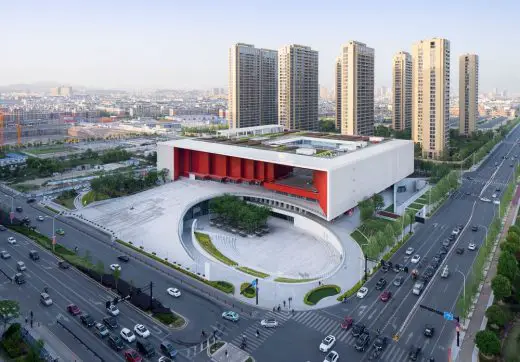
photograph : Qiang Zhao
Yiwu Cultural SquareBuilding
Design: The Architectural Design & Research Institute Of ZheJiang University Co,Ltd
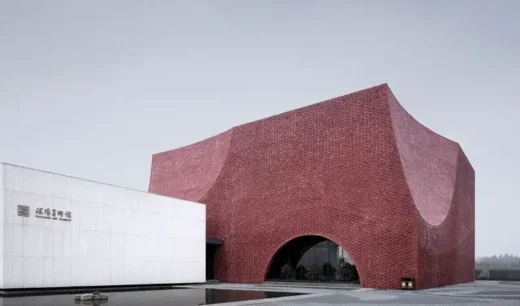
photograph : Qiang Zhao
Shuyang Art Gallery Building
Comments / photos for the Cloud Art Museum, Shenzhen designed by HLD Art & Design page welcome

